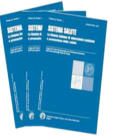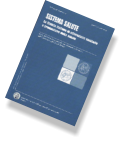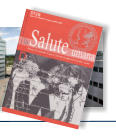








VOLUME 62, N°2 APRILE-GIUGNO



EDITORIA












VOLUME 62, N°4 OTTBRE-DICEMBRE



EDITORIA






Centro Sperimentale per la Promozione della Salute e l’Educazione Sanitaria






(Telefono: 075.585-7357/8036 - *Email: centro.cespes@unipg.it
Via del Giochetto, n°6 - 06126 - Perugia, Italia
Piazzale Severi,1 - 06132 -Perugia, Italia

Europe of Regions, Frame of European Development
Europa delle Regioni, Quadro dello sviluppo europeo
Arnd Hofmeister
Replacement Professor for Public Health and Childhood, Faculty of Applied Humanities,
University of Applied Sciences Magdeburg-Stendal (Germany)
Keywords: Europe of Regions, New Public Health Perspective, European solidarity
SUMMARY
This paper argues for a strengthening of the approach “Europe of Regions” based on European
Solidarity against all odds of current nationalist political developments. From a “New Public Health
Perspective” regions are the most appropriate Unit for public health policy and planning, because
they are close to the needs of people and to the places where they live, work, learn and play.
However in a context of the political “constitution” of the “European Union” such a bottom-up
perspective of a “Europe of Regions” requires some detailed differentiations. After shortly
reconstructing the history of the political framework “Europe of Regions” constitutional differences
will be described to then discuss political challenges. This paper argues that the framing of EU
policies follows mostly a top-down approach focusing of the negative integration of the markets
which is finally responsible for the decreasing support of the EU as a political union in the
population. Regions are mostly implementing EU policies and are positioned as competitors for
EU funding. Instead, a bottom-up approach is suggested which starts from the needs of the
people and articulates them in a joint vision of European solidarity. For sustainable development
in the EU, Public Health Advocacy needs to step outside the established frame of EU policy-
making to ask for policies of the many, not the few and show discontent where the EU falls short
of its own norms and values.
Parole chiave: Europa delle Regioni, nuova prospettiva di Sanità Pubblica, solidarietà europea
RIASSUNTO
L’articolo sostiene il rafforzamento dell'approccio "Europa delle Regioni" basato sulla solidarietà
europea contro ogni previsione degli attuali sviluppi politici nazionalisti. Da una "nuova
prospettiva di sanità pubblica" le Regioni sono l'unità più appropriata per la politica e la
pianificazione della sanità pubblica, perché sono vicine ai bisogni delle persone e ai luoghi in cui
vivono, lavorano, imparano e giocano. Tuttavia, in un contesto di "costituzione" politica
dell'"Unione europea", una prospettiva dal basso verso l'alto di una "Europa delle Regioni"
richiede alcune differenziazioni dettagliate. Dopo aver brevemente ricostruito la storia del quadro
politico "Europa delle Regioni" vengono descritte le differenze costituzionali
per poi discutere le sfide politiche. Questo documento sostiene che la definizione delle politiche
dell'UE segue per lo più un approccio dall'alto verso il basso incentrato sull'integrazione negativa
dei mercati, che è infine responsabile del sostegno decrescente dell'UE come unione politica
nella popolazione. Le Regioni attuano principalmente politiche dell'UE e si posizionano come
concorrenti per i finanziamenti dell'UE. Viene proposto un approccio dal basso che parte dai
bisogni delle persone e li articola in una visione congiunta di solidarietà europea. Per lo sviluppo
sostenibile nell'UE, l'advocacy della sanità pubblica deve uscire dall'ambito stabilito del processo
decisionale dell'UE per chiedere politiche dei molti, non di pochi ed evidenziare quando l'UE non
è all'altezza delle proprie norme e valori.
Autori per corrispondenza: arnd-hofmeister@gmx.de



